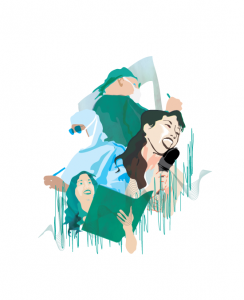A one-on-one singing lesson takes place on Bruin Walk, but instead of a piano or a conductor’s baton, artificial larynges and high-resolution images of vocal cords lay close at hand.
Rather than being a demonstration on the anatomy of the human throat, this unconventional vocal clinic celebrates and teaches something almost everybody has in common: the voice.
Today, the Voice Science Consortium at UCLA, consisting of faculty from the departments of linguistics, electrical engineering, and head and neck surgery, will bring to campus World Voice Day, an international event showcasing the scientific and artistic aspects of the human voice.
The events will take place throughout campus in Bruin Plaza, the UCLA Medical Plaza and the Court of Sciences.
This year marks the first time UCLA is participating in World Voice Day since its inception in 1999, said Patricia Keating, a professor of linguistics and an organizer of the day’s events. Beginning as a small-scale project in Brazil, the program has since expanded and is now celebrated in cities across the globe, from Los Angeles to Dublin to Mexico City.

(Bijun Liang/Daily Bruin)
Keating said the events represent a convergence of a variety of disciplines represented in a broader, more non-traditional way.
“The voice is wonderful because it is a place where medicine, the arts and science all meet at a common interest,” Keating said. “We use our voices, but we take them for granted, and this is a way to foster interest across the campus.”
The events include on-the-spot vocal technique lessons hosted by musicology graduate students, voice clinics taught by volunteer linguistics undergraduates and engineering demos held by electrical engineering faculty.
The main purpose of the activities, Keating said, is to foster a multidisciplinary awareness of the voice’s versatility, both in the sciences and in the arts.
To illustrate the scientific applications of the voice, faculty, graduate students and undergraduates from the departments of electrical engineering and linguistics will demonstrate how the human voice works through images and touchable models of the throat and vocal cords, Keating said.
The artificial models and computer images will be shown with the intent to educate the general student body on where the voice comes from and its significance in everyday living, Keating said.
“The thing that produces the voice in the body is so tiny – when you look for it, you can hardly see it,” Keating said. “Yet, it produces such a big sound that’s such an important part of our lives and is a crucial part of many people’s careers.”
To balance the scientific aspects of World Voice Day, Keating said she reached out to musicology faculty and graduate students to showcase the more artistic side of the human voice.
One of the events held in Bruin Plaza will be drop-in voice lessons held by Terri Richter, a doctoral student in the voice and opera department, and other musicology doctoral students and faculty.
Richter said the voice clinics consist of individual two-minute lessons that allow volunteers and participants to discover their hidden or neglected musicality.
“I think there are a lot of latent musicians and singer-songwriters walking around on campus who maybe sang in high school or were in a band, but sort of set it on the back burner,” Richter said. “We’re just going to give the students mini lessons to show them what they can do with their voices that they may not have realized they could do before.”
In addition to individualized events that engage students and faculty one-on-one, the UCLA Chorale will host the Chaffey College choirs and provide vocal clinics to suggest new performance techniques and singing methods as part of its Choral Outreach Program.
Rebecca Lord, the associate director of choral activities at the Herb Alpert School of Music and conductor of the UCLA Chorale, said a main goal of the clinic is to spread vocal awareness past the university’s boundaries.
“We’ll be teaching the students to sing differently than how they talk and to imitate the great soloists of their time,” Lord said. “I’d like the students to have a greater knowledge of how they can use their voices to ultimately express human feelings and emotions and experiences.”
Even though the day’s events showcase a broad range of topics and activities, Lord said the one thing that unites every participant in World Voice Day is the underlying passion for the human voice and its inherent versatility.
“The voice is the only living instrument, and so it is intrinsically linked to people’s feelings, to their identity, to their passions and life experiences,” Lord said. “We’re exploring the potential of the voice to transcend and surpass science, by using science as a means to an end of powerfully touching the human heart and spirit.”
